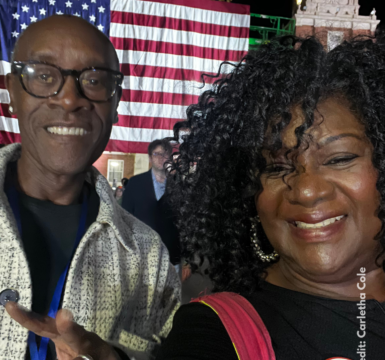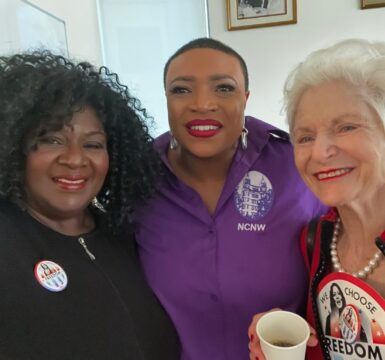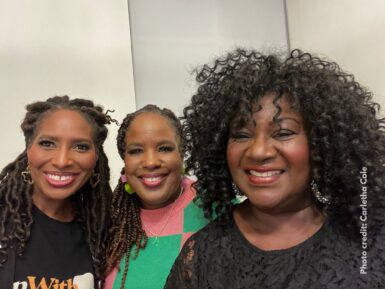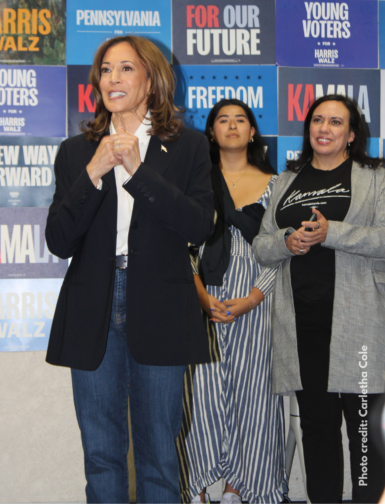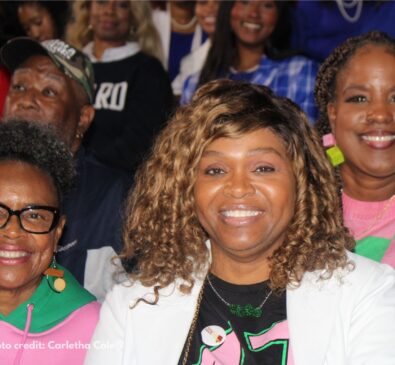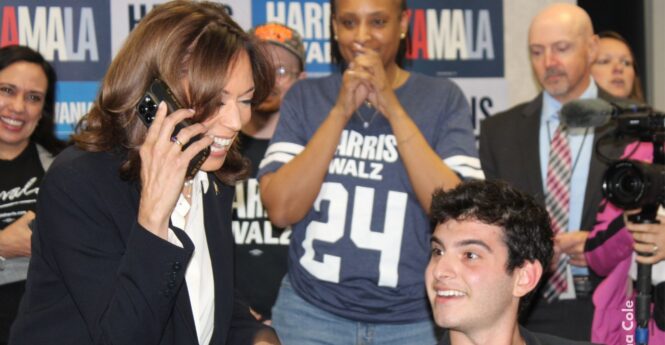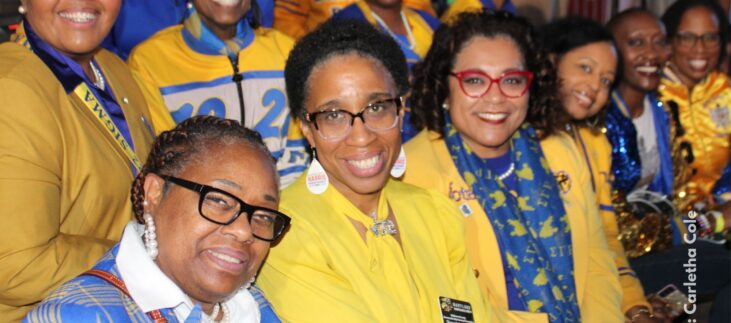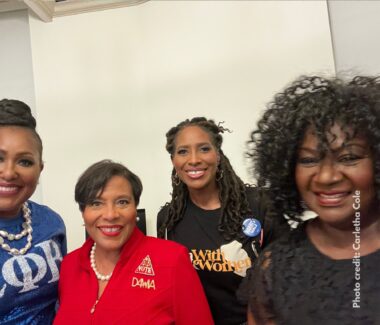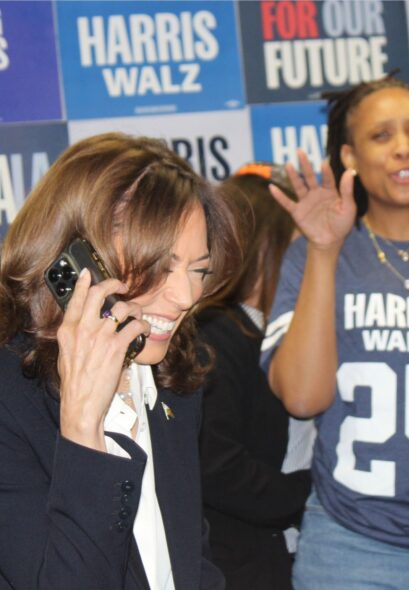
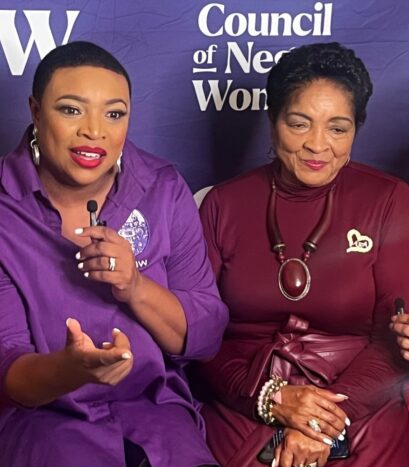
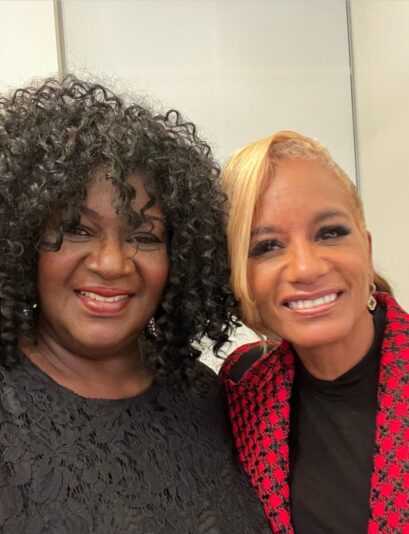
Kamala Harris: The Trailblazer Who Redefined the Campaign Trail
By Carletha Cole and Silke Endress Staff
As the dust settles on the 2024 election, Vice President Kamala Harris and her running mate, Minnesota Governor Tim Walz, may not have secured victory, but their campaign has left an indelible mark on the fabric of America. This wasn’t just a presidential campaign; it was a movement that championed reproductive rights, housing reform, and middle-class strength, led by a woman who made history simply by showing up.
A Campaign Rooted in Purpose
Harris' campaign was built on her tireless advocacy for reproductive rights, a cornerstone of her political identity since the Supreme Court overturned Roe v. Wade in 2022. From Pennsylvania to Minnesota, she met voters where they were, speaking not just as a leader but as a woman who understood the stakes. Her Reproductive Freedoms Tour was unprecedented, including a historic stop at an abortion clinic the first-ever visit by a sitting president or vice president.
But Harris didn’t stop there. She rolled out a housing plan designed to offer hope to working families struggling under the weight of sky-high costs. With promises like $25,000 in down-payment support for renters who paid on time for two years and a $10,000 tax credit for first-time homebuyers, she sought to offer practical solutions to a housing crisis that has left too many Americans behind. These ideas resonated deeply, even as the headwinds of inflation made the message harder to sell.
The Women Who Carried the Torch
Behind Harris was a battalion of women advocates, activists, and organizers who made this campaign a force to be reckoned with. Groups like the Divine Nine sororities, turned phone calls and community meetings into voter registration drives and rallies. The Win With Black Women initiative led by the ever-inspiring Jotaka Eaddy, became a rallying cry for thousands, blending modern activism with age-old sisterhood.
Minyon Moore, a seasoned political strategist, worked tirelessly behind the scenes, ensuring Harris’ voice remained front and center. Meanwhile, icons like Donna Brazile and Leah Daughtry lent their wisdom and clout to energize women voters across the country. And then there were the Pins for Purpose — those mighty symbols distributed by the Women Business Collaborative, led by Edie Fraser, Beth Ward and Anne-Marie Principe. Over 152,000 of these Kamala pins were handed out, sparking conversations and uniting a diverse coalition of supporters.
And then there were the Pins for Purpose — those mighty symbols distributed by the Women Business Collaborative, led by Edie Fraser, Beth Ward and Anne-Marie Principe. Over 152,000 of these Kamala pins were handed out, sparking conversations and uniting a diverse coalition of supporters.
The Loss That Still Inspires
Election Day didn’t go Harris’ way, and yet, her campaign succeeded in changing the narrative about who gets to lead in America. Losing isn’t failure when the fight you waged moves the needle forward. Harris’ campaign reminded us that progress doesn’t always happen in leaps—it often happens in the steps we take together.
For Harris supporters, this election wasn’t
about one night or one result. It was about laying the groundwork for a future
where women’s voices, especially those of women of color, can no longer be ignored. The sheer energy of the Chicago Democratic National Convention, hosted by stars like Kerry Washington and Tony Goldwyn, was a testament to Harris' ability to inspire across generations and backgrounds.
What Comes Next
Even in loss, Kamala Harris remains a beacon for millions. Her economic vision, her fight for reproductive freedom, and her dedication to working families will continue to shape the political conversation. The women who rallied for her—the Divine Nine, the business leaders, the grassroots organizers—aren’t going anywhere. They’ve built a network, a movement, a sisterhood that will only grow stronger.
Harris' campaign was more than a bid for the presidency: it was a call to action. And while the highest office in the land eluded her this time, she’s proven that glass ceilings aren’t just meant to be cracked—they’re meant to be shattered. America’s story with Kamala Harris is far from over.
The Howard University Yard:
A Beacon of Hope
The stage was set at Howard University, one of the nation's most iconic Historically Black Colleges and Universities (HBCUs), for a night of celebration, reflection, and hope. As the Harris-Walz presidential campaign awaited the results of a hard-fought election, the campus buzzed with energy, culture, and the echoes of history. It was not just a watch party—it was a declaration of pride, resilience, and unity.
On election night, the "Yard" at Howard University transformed into a vibrant epicenter of support and anticipation. The Divine Nine—the historically Black fraternities and sororities that form a cornerstone of the African-American community—showcased their unwavering backing for Vice President Kamala Harris, one of their own as a member of Alpha Kappa Alpha Sorority, Incorporated. With rhythmic stepping and strolling, their presence was a powerful reminder of the cultural foundation Harris represents.
The energy was electric as members of the Divine Nine performed, blending tradition with
contemporary pride. Chants of solidarity echoed across the Yard, uniting attendees under a shared purpose. It wasn’t just a watch party; it was a moment that embodied the spirit of Black excellence and community-driven leadership.
National Council of Negro Women:
Voices of Vision
Earlier in the day, the National Council of Negro Women (NCNW) headquarters served as a hub of engagement and critical dialogue. Led by Reverend Shavon Arline-Bradley, the NCNW hosted a series of compelling pre-election discussions. These conversations featured powerhouse figures such as Leah Daughtry, NCNW National Chair Dr. A. Lois Keith, Roslyn Brock, Chairman Emeritus, National Board of Directors and several sorority presidents.
The topics were robust and candid, ranging from voter suppression to the pivotal role Black women play in shaping the nation’s political landscape. Reverend Arline-Bradley described the NCNW’s efforts as “ground zero for the fight for democracy,” emphasizing that this election was about far more than politics—it was about safeguarding
progress and empowering future generations.
Kamala Harris’s Impact: Redefining Leadership
Kamala Harris’s presence on the ticket was historic and deeply symbolic. As the first woman of color to serve as Vice President, her candidacy alongside Governor Tim Walz represented a bold step forward for representation. Harris has spent her career breaking barriers—from her tenure as a California Attorney General to her groundbreaking vice presidency—and inspiring countless women, particularly women of color, to aspire to leadership roles.
Under Harris’s leadership, issues such as racial equity, women’s rights, and climate justice took center stage in the campaign. Her ability to connect with diverse communities and advocate for intersectional solutions was a hallmark of her political identity. Although the election results did not yield victory, Harris’s influence remains a beacon for future leaders and a reminder that representation matters.
The Conrad Hotel: VIPs Rally for Hope
As the evening progressed, the Conrad Hotel in Washington, D.C., became a gathering place for high-profile supporters and donors. The atmosphere was sophisticated yet warm, with a mix of optimism and somber reflection. Among the notable attendees were actor Don Cheadle, legal analyst Maya Wiley, civil rights activist Reverend Al Sharpton, and Khalil Thompson, founder of Win With Black Men. Their presence underscored the diverse coalition the Harris-Walz campaign had cultivated.
These VIP supporters mingled over discussions of the campaign’s successes and challenges,
acknowledging the unprecedented hurdles faced during the race. The camaraderie and commitment to shared values were palpable, even as the results began to signal a loss. The campaign may not have secured the presidency, but its broader mission to galvanize communities and advocate for equity remained undeterred.
The Election Results: A Moment of Reflection
As the final results came in, the air of celebration at Howard University shifted to one of resilience. Campaign’s loss was undeniably disappointing for the millions who had hoped for a second term for Kamala Harris. Yet, the evening did not feel like a defeat. Instead, it was a rallying cry for continued advocacy, grassroots organizing, and coalition-building.
Harris addressed the crowd with grace and determination, emphasizing the importance of perseverance. "This campaign was about more than winning an election," she said. "It was about proving that when we stand together, we can face any challenge."
A Legacy of Change and Inspiration
Despite the outcome, the Harris-Walz campaign left an indelible mark on American politics. Kamala Harris, a proud alumna of Howard University, remains a trailblazer whose impact will be felt for generations. Her candidacy inspired countless women and young people, particularly in historically marginalized
communities, to believe in the power of their voice.
Election night at Howard University was more than a political event—it was a cultural milestone that celebrated the progress made and the work still to come. From the powerful presence of the Divine Nine to the critical conversations led by the NCNW, the evening symbolized the enduring strength of collective action and the unyielding spirit of hope.
The Harris-Walz campaign may not have achieved electoral victory, but it succeeded in energizing a movement rooted in justice, equity, and representation. Kamala Harris’s legacy as a leader and trailblazer remains unshaken, a testament to the progress that can be achieved when communities come together for a common cause.
